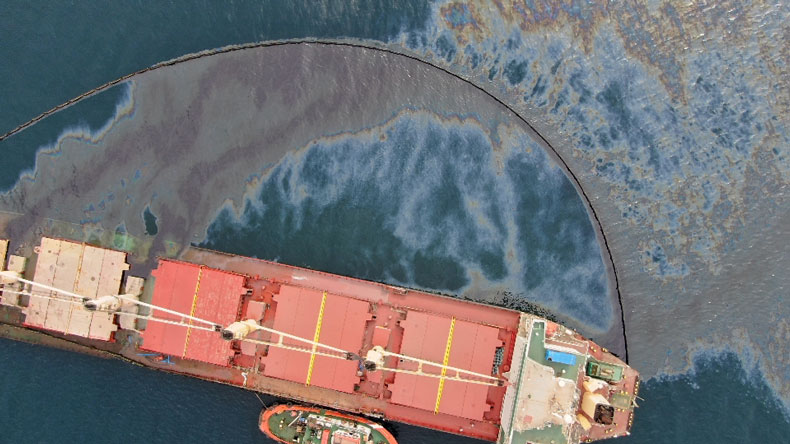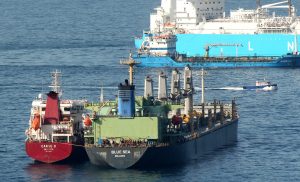Bunker oil spills represent one of the most severe environmental hazards in the maritime industry, causing devastating ecological and economic consequences. These spills occur during fueling operations or accidents involving ships, leading to the release of heavy fuel oil into marine ecosystems. This article examines the causes, environmental impacts, and effective strategies for preventing and mitigating bunker oil spills in maritime operations.
Bunker oil, commonly used as marine fuel, is a dense, viscous petroleum product. Due to its high sulfur content and slow biodegradation, bunker oil poses significant environmental risks when spilled into the ocean.
Key Environmental Hazards of Bunker Oil Spills:
- Marine Pollution: Bunker oil forms thick layers on water surfaces, blocking sunlight and reducing oxygen exchange, harming aquatic life.
- Habitat Destruction: Oil-contaminated shorelines disrupt habitats of birds, marine mammals, and coastal flora.
- Toxic Effects: Exposure to toxic hydrocarbons in bunker oil affects the health and reproductive systems of marine organisms.
- Economic Consequences: Spills result in costly cleanup operations, legal liabilities, and disruptions to fisheries and tourism.
Causes of Bunker Oil Spills
Several factors contribute to bunker oil spills, often linked to operational errors, equipment failures, and environmental conditions:
1. Operational Mistakes
- Fueling Errors: Incorrect fuel transfer procedures during bunkering can lead to overflows and spills.
- Human Error: Inadequate training, communication failures, and poor oversight increase the likelihood of spills.
2. Equipment Failures
- Pipeline Leaks: Faulty fuel pipelines and valves can rupture, causing leaks during refueling.
- Storage Tank Failures: Structural damage to onboard fuel tanks due to corrosion or collisions can release oil into the sea.
3. Maritime Accidents
- Collisions and Groundings: Vessel collisions and groundings can result in hull breaches, causing large-scale spills.
- Severe Weather Events: Storms and rough seas increase the risk of ship accidents and fuel containment failures.
Environmental Impact of Bunker Oil Spills
Bunker oil spills pose severe environmental risks, causing long-lasting damage to marine ecosystems, wildlife, and coastal communities. When spilled into the ocean, bunker oil creates a toxic environment that disrupts the natural balance of marine life. Aquatic organisms such as fish and marine mammals suffer respiratory distress and eventual death due to oil coating their gills and bodies. Seabirds face similar threats, losing their insulating ability when covered in oil, leading to hypothermia and significantly reduced survival rates. Coral reefs, essential for marine biodiversity, also suffer as oil deposits cause bleaching and habitat destruction.
The impact extends beyond the open ocean, devastating coastal environments like mangroves and wetlands, which are critical for supporting diverse ecosystems. Oil contamination in these areas destroys habitats, leading to a significant reduction in biodiversity. Beaches and shorelines become polluted, harming local economies reliant on tourism and fishing industries. The visible environmental degradation caused by oil-soaked coastlines further disrupts human livelihoods.
The ecological damage from bunker oil spills persists long after the initial incident due to the oil’s resistance to natural degradation. Its heavy, viscous nature makes cleanup efforts challenging and slow. Additionally, toxic chemicals from the oil accumulate in the marine food chain, resulting in bioaccumulation that affects top-level predators and ultimately threatens global seafood supplies. The environmental, economic, and social consequences of bunker oil spills underscore the urgent need for effective spill prevention, response measures, and long-term environmental management strategies.
Prevention Strategies for Bunker Oil Spills
Preventing bunker oil spills requires a multi-faceted approach involving operational best practices, technological innovations, crew training, and adherence to international regulations. Ship operators must implement strict bunkering procedures, including pre-bunkering checklists and real-time fuel monitoring systems to prevent accidental discharges. Routine inspections of fuel transfer equipment, pipelines, and valves help identify potential failures before they escalate into environmental disasters. Regular emergency response drills ensure crew readiness, enabling efficient spill management when incidents occur.
Technological advancements play a crucial role in oil spill prevention. Installing oil spill detection systems with sensors and monitoring devices enables early leak detection, minimizing potential damage. Double-hull fuel tank designs reduce spill risks in the event of collisions, while remote monitoring platforms utilizing satellite imagery and drones facilitate real-time spill surveillance and damage assessment.
Crew training and environmental awareness programs further reinforce oil spill prevention efforts. Certified safety courses equip crew members with the necessary skills to manage fuel transfers safely and respond effectively to spills. Promoting environmental stewardship through sustainability initiatives fosters a proactive shipboard culture. Adhering to the International Maritime Organization’s (IMO) MARPOL Annex I regulations on oil pollution prevention ensures compliance with globally recognized environmental standards.
International regulations and industry standards provide a robust framework for spill prevention. Compliance with IMO conventions such as MARPOL and the International Convention on Oil Pollution Preparedness, Response, and Co-operation (OPRC) mandates strict pollution prevention protocols. Flag state inspections ensure vessels meet safety and environmental requirements, holding shipowners accountable. Additionally, industry partnerships with organizations like ITOPF and IPIECA provide access to oil spill response resources, specialized training, and expert consultation, strengthening global spill prevention capabilities.
Mitigation and Response to Bunker Oil Spills
Despite prevention efforts, oil spills may still occur due to unforeseen events. A well-coordinated response can minimize environmental damage.
1. Immediate Containment Measures
- Deploying Booms: Floating barriers prevent oil from spreading across the water’s surface.
- Skimmers and Absorbents: Mechanical skimmers and absorbent materials remove oil from the water.
- Chemical Dispersants: Carefully applied dispersants break down oil into smaller droplets, speeding up natural biodegradation.
2. Cleanup Operations
- Shoreline Cleanup: Specialized teams use manual and mechanical methods to clean contaminated coastlines.
- Waste Disposal: Proper disposal of oil-contaminated materials to prevent secondary pollution.
- Environmental Monitoring: Long-term ecological assessments ensure the recovery of affected ecosystems.
3. Post-Spill Evaluations
- Incident Investigations: Identifying the root causes of spills to prevent recurrence.
- Regulatory Reviews: Strengthening regulations and industry practices based on spill investigation findings.
- Compensation and Liability Claims: Pursuing compensation for environmental damage and restoration costs through legal frameworks.
Bunker oil spills pose severe environmental, economic, and social challenges, requiring a multi-pronged approach involving prevention, preparedness, and response. By implementing best practices, embracing technological innovations, and adhering to international regulations, the maritime industry can reduce the occurrence and impact of oil spills. A commitment to continuous improvement and environmental responsibility will ensure the protection of marine ecosystems for future generations.




